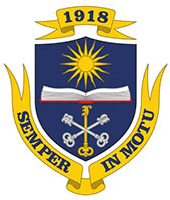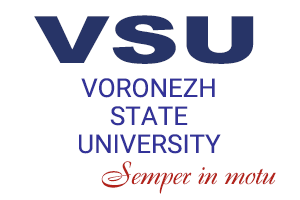The results of the International Translation Competition dedicated to the Victory Day of the Great Patriotic War were announced. Among its participants were 653 people from different parts of Russia and neighbouring countries. As a result, a second-year student of the Faculty of Romance and Germanic Philology, Alina Pribytkova, took first place and a third-year student, Georgii Malyarenko, took third place.
“On the eighth of May we received the long-awaited results of another competition, organised by South Ural State University, testing our students’ professional translation skills. We are happy that the students of the Faculty of Romance and Germanic Philology were among the prize-winners of the contest that has international status and, what's more, was dedicated to this year's Victory Day. The organisers highlighted that the participants from our university actively participated in the contest. 15 students, our future military and civilian translators, participated in the contest”, said Larisa Kuzmina, Head of the Department of Translation and Professional Communication.
Alina Pribytkova, a second-year student specialising in “Translation and translation studies”, talked about her inspiration for the participation in the competition.
“It is such a cosy and creative feeling when you have a strict deadline, but you are on your own with the text, you are “communicating” with it and trying to understand how to translate it.
I have never won any contest before and I rarely took part in them. But when I saw that my family was so happy about my success in studying and how they supported my plans, I wanted to work even harder and not be afraid of challenging myself! I am also very grateful to my lecturers who supported me and helped to prepare for the competition. I am a second-year student, and we haven't even had any practical translation courses yet, but the lecturer's voice saying “Alina, go ahead, you still have time before the deadline!” and the fact that my groupmates also actively participated in the contest gave me confidence. It was a great experience for me. I've learned how to prepare and format the text, how many times to edit it and check for mistakes. And when you think that it is finally done, you suddenly notice that you forgot to translate some technical data or things like that. Now I understand that my future profession is exquisitely hard and requires a lot of discipline, diligence, and patience.”
Associate Professor Elena Pivovarova emphasised that at VSU future translators get a chance to practise their skills starting from the first years of studies. “Participation in such competitions gives future translators an opportunity to practice their obtained skills and knowledge in a “real situation” instead of under “laboratory conditions”.
These contests provide them with serious experience similar to a real situation, because here you have a client, a deadline, and a sense of responsibility for the work you have done, which you can fully understand only when you get a real translation assignment. Moreover, participation in contests helps students to look at their work from the outside and to find out what things need to be improved. It is really important for us, as our goal is to train specialists who are aware of the practical side of the translator's profession”.
Future military translator Georgiy Malyarenko said that working with his text wasn’t an easy task. “I had to translate a text about the victory in the war, about restoring the peace, about people and their return to normal life.
The war, which the author of the text compares with evil darkness and hopelessness, is finally over. And it was very important to convey people’s feelings at that moment as precisely as possible. This may seem a challenging task for someone from another generation, a completely different era. We have never faced anything like that and our experience is not enough to describe what people felt at that time. But translators have to cope with this challenge. It’s their professional duty. This is what our mentors teach us!”
Associate Professor Svetlana Lukina explained why it is important to take part in such competitions.
“While working on this translation project, future military translators, acting quickly and friendly, shared links to some unknown facts with each other, thus improving everyone's cultural background. The translation of historical and culture-specific concepts of those times was especially hard. The current generation has very superficial knowledge of the era of the mid-twentieth century. I believe that translation of culturally significant texts containing a lot of culture-specific concepts of a certain period is not only important for the development of students’ skills in the translation of these concepts, but is also an integral part of their patriotic education. It is especially relevant today, when certain attempts are made to rewrite our history and belittle the Soviet soldier's deeds in the fight against fascism. We are well aware of that and we have to stop these manipulative technologies from distorting our conceptions of the past.”
Olga Boriskina, Dean of the Faculty of Romance and Germanic Philology, agreed with her colleague and said that the staff's work was well-coordinated.
“While working on their translation, students realised that in addition to the translation of the text, participation in the contest also involves serious organisational activities performed by the students themselves. These conditions are similar to a real-life situation where you plan your work on your own, set up a strict schedule according to the deadline, and calculate the time you need to translate and edit the text. It is also highly important to learn to read technical requirements carefully (in this case, it was a letter from the organising committee), follow the specified instructions, and practice business communication in their native language when filling in the accompanying documents. That's why the presence of a mentor lecturer during the preparatory stage becomes an additional source of professional knowledge for the participants of the contest. Interaction outside the classroom allows lecturers to show students what organisational skills they need to develop. Organisational skills together with the practical skills of translation compose our graduates’ highly-developed translation competence, which leads them along the path to professional success.”














